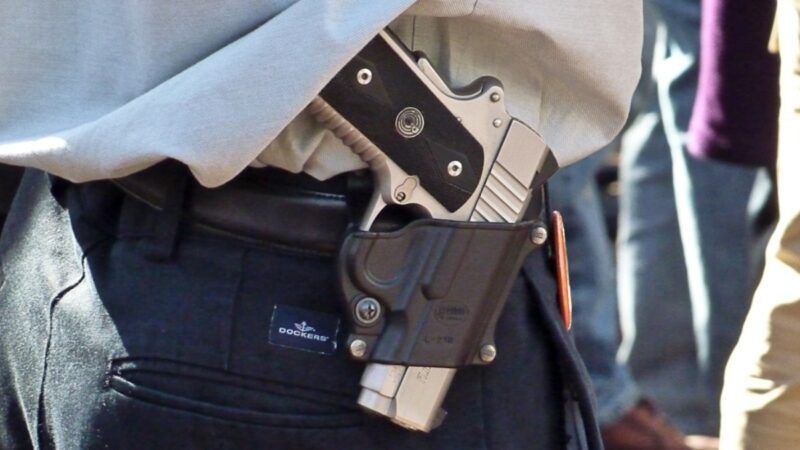SCOTUS Will Consider a Challenge to Hawaii's Default Rule Against Guns on Private Property Open to the Public
The law is one of several attempts to override the right to bear arms by making it impractical to exercise.

The Supreme Court on Friday agreed to hear a Second Amendment challenge to a Hawaii law that bans guns on private property open to the public without the owner's "express authorization." The case, Wolford v. Lopez, involves one of several attempted end runs around the Court's 2022 ruling in New York State Rifle & Pistol Association v. Bruen, which upheld the constitutional right to carry guns in public for self-defense without demonstrating a "special need."
Several states, including New York, Hawaii, California, Maryland, and New Jersey, responded to Bruen by making carry permits easier to obtain but much harder to use. They banned guns from long lists of "sensitive places" that covered a lot of territory, which in many cases made it impractical to legally exercise the right that the Supreme Court had recognized.
The broadest of those restrictions was a default rule that people could not carry guns on private property, including businesses open to the public, unless they had the owner's explicit permission. Under Hawaii's law, that requires "unambiguous written or verbal authorization" or "clear and conspicuous signage."
Last year in Wolford v. Lopez, the U.S. Court of Appeals for the 9th Circuit deemed that rule "consistent with this Nation's historical tradition of firearm regulation"—the constitutional test prescribed by Bruen. "The Second Amendment encompasses the right to bear arms not only in publicly owned spaces, but also on private property that is generally open to the public," the appeals court conceded. "Equally clear, however, is the right of a private property owner to exclude others, including those bearing arms."
The 9th Circuit found historical precedent for Hawaii's restriction in two sets of colonial or state laws enacted in the 18th and 19th centuries. It identified four laws that "prohibited the carry of firearms onto subsets of private land, such as plantations or enclosed lands." It also noted two laws, enacted by New Jersey in 1771 and Louisiana in 1865, that it read as prohibiting "the carrying of firearms onto any private property without the owner's consent."
The record "contains no evidence whatsoever that these laws were viewed as controversial or constitutionally questionable," the appeals court said. "Instead, they were viewed as falling well within the colony's or the State's ordinary police power to regulate the default rules concerning private property." It concluded that "the Nation has an established tradition of arranging the default rules that apply specifically to the carrying of firearms onto private property" and that "Hawaii's modern law falls well within the historical tradition."
That decision contradicted the reasoning of Antonyuk v. James, a 2023 decision in which the U.S. Court of Appeals for the 2nd Circuit rejected a similar rule that New York legislators imposed after Bruen. New York's law banned gun possession on private property when the owner "has not permitted such possession by clear and conspicuous signage indicating that the carrying of firearms, rifles, or shotguns on their property is
permitted or has otherwise given express consent."
In defense of that provision, New York cited the same early laws on which Hawaii relied in Wolford. "We assume without deciding that the State's analogues demonstrate a well-established and representative tradition of creating a presumption against carriage on enclosed private lands, i.e., private land closed to the public," the 2nd Circuit said. "But we do not agree that these laws support the broader tradition the State urges. These analogues are inconsistent with the restricted location provision's default presumption against carriage on private property open to the public."
Those early laws, the appeals court said, were not "relevantly similar" to New York's provision in motivation and scope. "At least three of the State's proffered analogues were explicitly motivated by a substantially different reason (deterring unlicensed hunting) than the restricted location regulation (preventing gun violence)," the 2nd Circuit noted. "What is more, none of the State's proffered analogues burdened Second Amendment rights in the same way as [New York's law]. All of the State's analogues appear to, by their own terms, have created a default presumption against carriage only on private lands not open to the public."
Two of those laws referred to "premises" as well as "lands." But "as it has been developed thus far, the historical record indicates that 'land,' 'improved or inclosed land' and 'premises or plantations' would have been understood to refer to private land not open to the public," the 2nd Circuit said. "The State has produced no evidence that those terms were in fact otherwise understood to apply to private property open to the public or that the statutes were in practice applied to private property open to the public."
The appeals court emphasized the broad scope of New York's rule. "Given that most spaces in a community that are not private homes will be composed of private property
open to the public," it said, "the restricted location provision functionally creates a universal default presumption against carrying firearms in public places, seriously burdening lawful gun owners' Second Amendment rights. That burden is entirely out of step with that imposed by the proffered analogues, which appear to have created a presumption against carriage only on private property not open to the public."
The plaintiffs in Wolford, three residents of Maui and the Hawaii Firearms Coalition, argue that the 2nd Circuit got it right, while the 9th Circuit got it wrong. "To be sure, private-property owners may decide to exclude people from their property," they say in their Supreme Court petition. "But that power resides with the property owner, not the government. There is no comparable historical—or even modern-day—tradition of allowing the government to create a no-carry default rule for private property open to the public."


Show Comments (14)